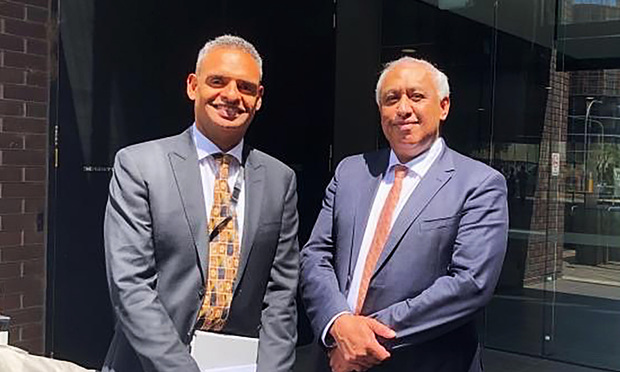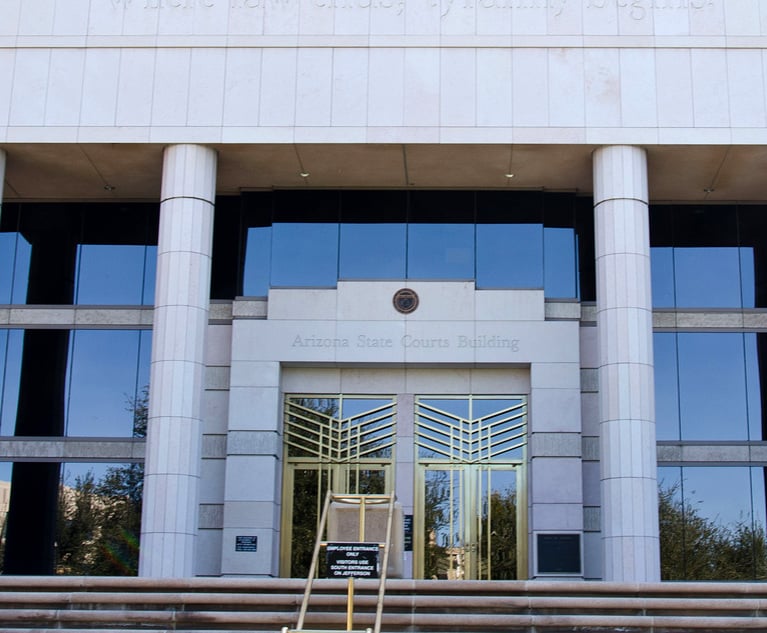Why 2 Australian Indigenous Lawyers Practice Commercial Law
Indigenous lawyers in Australia typically go into practice areas that deal with the issues and problems highlighted by Black Lives Matter and similar protest movements. Bero and Mailman want to broaden their reach as a way to support Aboriginal communities.
July 12, 2020 at 07:00 PM
6 minute read
 Brian Bero (L) and Bevan Mailman (R), of Jaramer Legal, Australia's first national majority Indigenous-owned law firm.
Brian Bero (L) and Bevan Mailman (R), of Jaramer Legal, Australia's first national majority Indigenous-owned law firm.
Human rights and criminal law are often the first choice for Indigenous lawyers working to improve the lot of their people. But Bevan Mailman and Brian Bero have taken a different approach to the advancement of Aboriginal and Torres Strait Islander Australians.
The two principals of Jaramer Legal are commercial lawyers. They aim to lay the economic foundations for change in remote and regional Indigenous communities and to develop Indigenous commercial lawyers.
Jaramer Legal, Australia's first national majority Indigenous-owned law firm, was founded in 2018 as a joint venture between Mailman and Bero and global law firm Norton Rose Fulbright. Norton Rose has a minority interest in the relatively new firm, and provides support in the form of capital, premises and sometimes lawyers on secondment.
"I became a commercial lawyer because I knew that for us as Indigenous people to move forward, we needed to lay our economic platforms and, to lay them, we needed to understand frameworks and the structure of things, such as businesses and trusts," Bero explained.
The firm name, Jaramer, came about because Mailman is from the Bidjara people of Central West Queensland and Beno is from the Meriam people in the Torres Strait Eastern Islands. The two lawyers combined the words to create Jaramer, loosely translating to mean "one mountain."
"We think all communities should come together as one, and the mountain represents a strong base and that base needs to be laid before we go forward," Bero said.
Indigenous Australians sit at or near the bottom of just about every socioeconomic indicator in Australia. Those born between 2010 and 2012 can expect to live about a decade less than the non-Indigenous; about 62% of Indigenous students completed high school in 2014-15, compared with 86% of non-Indigenous Australians; and as of September 2017, Indigenous prisoners represented 27% of the total adult prisoner population while accounting for just 2% of the total Australian adult population.
Mailman and Bero see self-determination and economic empowerment as a path to turning around these numbers.
"There's a need to build generational wealth for communities, especially those that don't have ready access to government services," said Mailman, who is based in Melbourne.
"We're working with those communities to make sure they're self-governing, that they're independent and that they're growing."
Some 70% of Northern Australia is under Native Title ownership, which confers beneficial ownership of land to local Aboriginal and Torres Strait Islanders, including the economic windfall from activities such as mining, grazing, tourism and fishing.
The foundational case for native title rights was Mabo v. Queensland (1992), when Torres Straits Islander land rights campaigner Eddie Mabo challenged and overturned the doctrine of terra nullius, which effectively held that when the English colonized Australia in 1788 the land was uninhabited.
It was through this case that Bero got his first exposure to the law, as a 6-year-old attending a community school founded by Mabo. He watched the land rights activist pursue his campaign and start the court case.
"Because I was so young, I didn't understand that you needed lawyers to fight such things through legal processes. I just thought, 'well, why don't we do it?' And then I realized as I got older that we couldn't because we weren't lawyers," said Bero, who is based in Sydney.
After working as a fitter and turner in mining, Bero studied law and worked as an associate to Federal and Supreme Court judges. He then did stints as in-house counsel at Australia's largest telecommunications company, Telstra, and at tech company Oracle and flagship airline Qantas.
Indigenous lawyers typically go into practice areas that deal with the issues and problems highlighted by Black Lives Matter and similar protest movements: criminal law, family law and human rights law. Bero wanted to change this.
"I didn't actually get into the field of commercial corporate law so I could represent indigenous businesses or the indigenous community specifically," he said. "I thought to myself, why couldn't I get a role as a commercial or corporate lawyer and just be like any other non-Indigenous lawyer and be involved in the deals and sit at the negotiating table."
Through most of his career, he's been the only Indigenous lawyer at the table.
Mailman joined Norton Rose as a cadet—the title given to law students in Australia who work part-time at law firms. One of his earlier supervisors was Peter Cash, a commercial dispute resolution partner and the driving force behind Norton Rose's backing of Jaramer Legal.
Bero and Mailman said their previous work and experience with remote communities equip them to act in the long-term interests of the Indigenous communities they represent.
"We bring an intrinsic knowledge of indigenous culture, the networks and an understanding of how communities actually work," Bero said.
The firm also undertakes commercial work for governments, such as helping to develop Indigenous procurement policies. It also undertakes general commercial work, such as for the Australian Taxation Office or the National Broadband Corporation, which will help expose younger lawyers to the broader field of commercial law.
Bero describes the firm as a startup that's been in operation for just over a year, and said he will work toward building the business before he hires the next generation of indigenous lawyers.
But he wants Jaramer Legal to have a strong employment intake of indigenous lawyers.
"We want to introduce those lawyers not only to the commercial field but also to how important that is in relation to supporting Aboriginal communities in moving forward," Mailman said.
This content has been archived. It is available through our partners, LexisNexis® and Bloomberg Law.
To view this content, please continue to their sites.
Not a Lexis Subscriber?
Subscribe Now
Not a Bloomberg Law Subscriber?
Subscribe Now
NOT FOR REPRINT
© 2025 ALM Global, LLC, All Rights Reserved. Request academic re-use from www.copyright.com. All other uses, submit a request to [email protected]. For more information visit Asset & Logo Licensing.
You Might Like
View All
The Law Firm Disrupted: With KPMG's Proposed Entry, Arizona's Liberalized Legal Market is Getting Interesting

Big Company Insiders See Tech-Related Disputes Teed Up for 2025
Law Firms Mentioned
Trending Stories
- 1Supreme Court Takes Up Challenge to ACA Task Force
- 2'Tragedy of Unspeakable Proportions:' Could Edison, DWP, Face Lawsuits Over LA Wildfires?
- 3Meta Pulls Plug on DEI Programs
- 4On the Move and After Hours: Meyner and Landis; Cooper Levenson; Ogletree Deakins; Saiber
- 5State Budget Proposal Includes More Money for Courts—for Now
Who Got The Work
Michael G. Bongiorno, Andrew Scott Dulberg and Elizabeth E. Driscoll from Wilmer Cutler Pickering Hale and Dorr have stepped in to represent Symbotic Inc., an A.I.-enabled technology platform that focuses on increasing supply chain efficiency, and other defendants in a pending shareholder derivative lawsuit. The case, filed Oct. 2 in Massachusetts District Court by the Brown Law Firm on behalf of Stephen Austen, accuses certain officers and directors of misleading investors in regard to Symbotic's potential for margin growth by failing to disclose that the company was not equipped to timely deploy its systems or manage expenses through project delays. The case, assigned to U.S. District Judge Nathaniel M. Gorton, is 1:24-cv-12522, Austen v. Cohen et al.
Who Got The Work
Edmund Polubinski and Marie Killmond of Davis Polk & Wardwell have entered appearances for data platform software development company MongoDB and other defendants in a pending shareholder derivative lawsuit. The action, filed Oct. 7 in New York Southern District Court by the Brown Law Firm, accuses the company's directors and/or officers of falsely expressing confidence in the company’s restructuring of its sales incentive plan and downplaying the severity of decreases in its upfront commitments. The case is 1:24-cv-07594, Roy v. Ittycheria et al.
Who Got The Work
Amy O. Bruchs and Kurt F. Ellison of Michael Best & Friedrich have entered appearances for Epic Systems Corp. in a pending employment discrimination lawsuit. The suit was filed Sept. 7 in Wisconsin Western District Court by Levine Eisberner LLC and Siri & Glimstad on behalf of a project manager who claims that he was wrongfully terminated after applying for a religious exemption to the defendant's COVID-19 vaccine mandate. The case, assigned to U.S. Magistrate Judge Anita Marie Boor, is 3:24-cv-00630, Secker, Nathan v. Epic Systems Corporation.
Who Got The Work
David X. Sullivan, Thomas J. Finn and Gregory A. Hall from McCarter & English have entered appearances for Sunrun Installation Services in a pending civil rights lawsuit. The complaint was filed Sept. 4 in Connecticut District Court by attorney Robert M. Berke on behalf of former employee George Edward Steins, who was arrested and charged with employing an unregistered home improvement salesperson. The complaint alleges that had Sunrun informed the Connecticut Department of Consumer Protection that the plaintiff's employment had ended in 2017 and that he no longer held Sunrun's home improvement contractor license, he would not have been hit with charges, which were dismissed in May 2024. The case, assigned to U.S. District Judge Jeffrey A. Meyer, is 3:24-cv-01423, Steins v. Sunrun, Inc. et al.
Who Got The Work
Greenberg Traurig shareholder Joshua L. Raskin has entered an appearance for boohoo.com UK Ltd. in a pending patent infringement lawsuit. The suit, filed Sept. 3 in Texas Eastern District Court by Rozier Hardt McDonough on behalf of Alto Dynamics, asserts five patents related to an online shopping platform. The case, assigned to U.S. District Judge Rodney Gilstrap, is 2:24-cv-00719, Alto Dynamics, LLC v. boohoo.com UK Limited.
Featured Firms
Law Offices of Gary Martin Hays & Associates, P.C.
(470) 294-1674
Law Offices of Mark E. Salomone
(857) 444-6468
Smith & Hassler
(713) 739-1250









